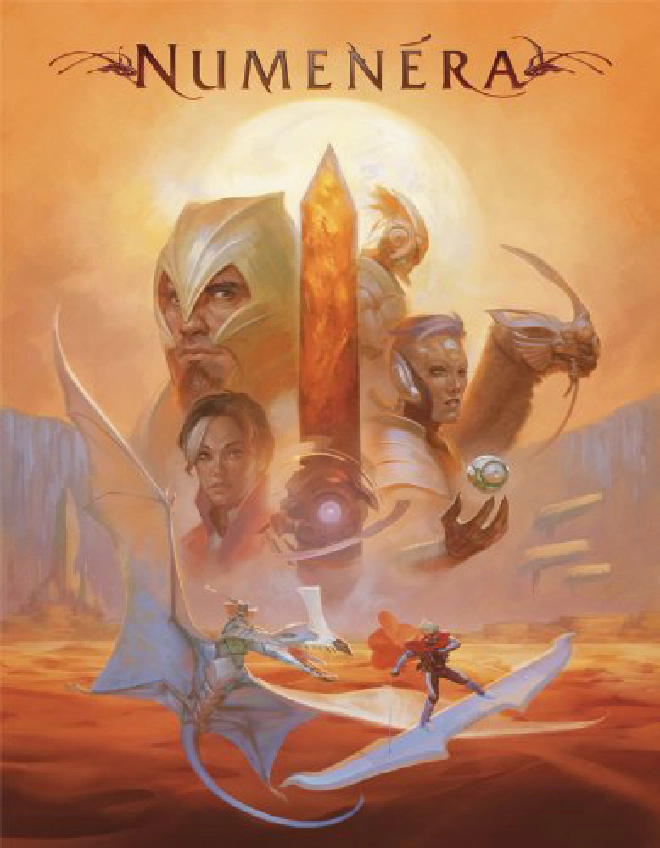
As I’ve been running my D&D campaign, I’ve become interested in the alternative role-playing systems that came about after my initial foray into gaming. It all started because I was looking for inspiration for fun rule tweaks I could incorporate into my games that would foster more role-play and streamline combat. So I began a journey to collect examples of common rulesets, and ended up reading quite a few large PDF corebooks. A discussion of all of those systems is too big a topic for this post, but I do want to share my thoughts on a new game that was released in the midst of my research.
Numenera is a new tabletop RPG from Monte Cook Games. It makes use of a simple system of rules dubbed “The Cypher System”, which is designed to simplify character creation and gameplay.
Character Creation & General Concepts #
Character creation in Numenera is deceptively simple, and effectively abstracts away the complexities of system. Essentially, you build your character around a single statement that identifies three aspects: an adjective, a character class, and a verb. For example, I am a Charming Nano Who Speaks With Ancient Power.
That’s it.
Kind of.
That statement translates into various stats, which in turn control the difficulty your character will face when attempting various actions. You can use these abilities to exert Effort towards a given task, which in turn lowers the difficulty for success, or to fuel your special abilities. You have to be careful though, because the same attribute pools that you use to lower your difficulty also represent your health. Exerting Effort towards a task or conflict will drain your character and make them more vulnerable, so a player will need to use some discretion when flexing their might, as regenerating the points in those pools can only be done by resting.
For a quick rundown of how this works together, you may find the video below useful.
The Rule of the Strange: Discovery & XP #
The truly interesting thing about Numenera is that – unlike most traditional RPGs – players are not rewarded for combat, but rather for discovery. This seems a bit odd at first; after all, while discovery has always had a role in RPGs, it’s emphasis varies quite a bit by individual groups, so making it the center of the mechanic feels a bit alien. Of course, that’s the point.
The mechanic only seems out of place until you realize just how strange Monte Cook has made the world of Numenera. The game takes place in a far-distant future, where eight great civilizations have risen the pinnacle of interplanetary power, only to then fall. The people of the world have no memory of these great cultures, and are merely trying to make a life for themselves among the ashes. A city might live in the shadow of a mountain that was once an engine, or a forest that was once a living ship, and have no idea of the true nature of either. Though of combination of living off the land and scavenging ancient technology so complex that it might as well be magic, the people get by. Players take on characters who either choose – or are forced by circumstances – to leave the safety of these colonies to explore the wilds of this world.
In that context, it makes total sense that XP would be awarded to players based on the discoveries that a player makes over the course of the game. Of course, herein we have another difference. In most games, XP is accumulated by players in order to gain a level. Players in Numenera also use XP to advance their characters, but there is no notion of a “level” in the game. Instead, players can use their awarded XP as currency to purchase better proficiency at specific skills. Practically, this ends up being similar, but means players have to choose to spend their XP carefully, rather than just earning it and generally becoming more awesome as a result.
There is one other way to earn XP as a player, and that is by GM Intrusion. An Intrusion is where the GM takes initiative to increase the difficulty of a task or force an aspect of the plot, much like a Compel in Fate. For example, in combat the DM might state that a character drops their weapon when an enemy strikes them, or that a character is afflicted with vertigo which will hamper their ability to climb a wall. When a player is the subject of an Intrusion their character immediately receives 2 XP, but must immediately give one of the points to another player of the subject’s choosing. There isn’t any guidance on what criteria the player should use for this award; that is left up to each individual play group to determine.
A Few Concerns #
Reading through this as a GM, I came across several aspects of the game that caused me to raise an eyebrow. There are some suggestions in the core rulebook that are less than helpful to a GM just getting their feet wet in this system.
First, the rulebook goes out of its way on several occasions to explain that there is no such thing as encounter balancing in Numenera. The reasoning is that there is no reason for opponents to be conveniently leveled in proportion to the characters. This seems to a little odd to me, and appears to be a response to D&D 4E, where this is a key notion. While the argument behind the concept is certainly true, it doesn’t do much to help a GM just starting with a game to design encounters in such a way that characters are challenged without being overwhelmed. I foresee that most GMs starting out will end up making the session too easy for players or make a major misstep in the other direction.
From a storytelling perspective, the world itself is a difficult thing to pick apart. It’s intended to be strange, and utterly alien to us today. As an acquaintance of mine observed, the theme of the game for the GM is “when in doubt, go more strange”. [That’s something that could be a lot of fun, or could be a way for a GM to spin enough rope to hang themselves with. I don’t envy fledgling GMs trying to make that distinction, but I have to admit to being thrilled by the challenge. I’m a sucker for the sci-fi as fantasy genre anyway.
The Proof’s in the Playtest #
Of course, all of this is academic without a proper playtest, something I haven’t had a chance to do with my group yet. It’s quite possible that all of these things Just Work Out during gameplay. After all, the core rulebook focuses less on detailing every scenario under the sun as opposed to providing a general methodology that can be applied to any situation that happens to come up at the table.
That’s really what excites me about Numenera: a game that focuses heavily on role-playing, while maintaining more structure than a free-form collaborative storytelling game. On top of that, it’s set in a world that by definition is open to the strangest things I can imagine. More importantly, I think it’s something my players will dig, and I’m looking forward to introducing them to it.
Explorers Wanted #
If you’ve already played Numenera, I’d love to hear about your experiences here. Please share them in the comments below!
